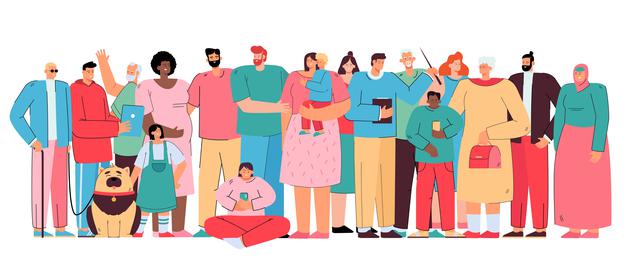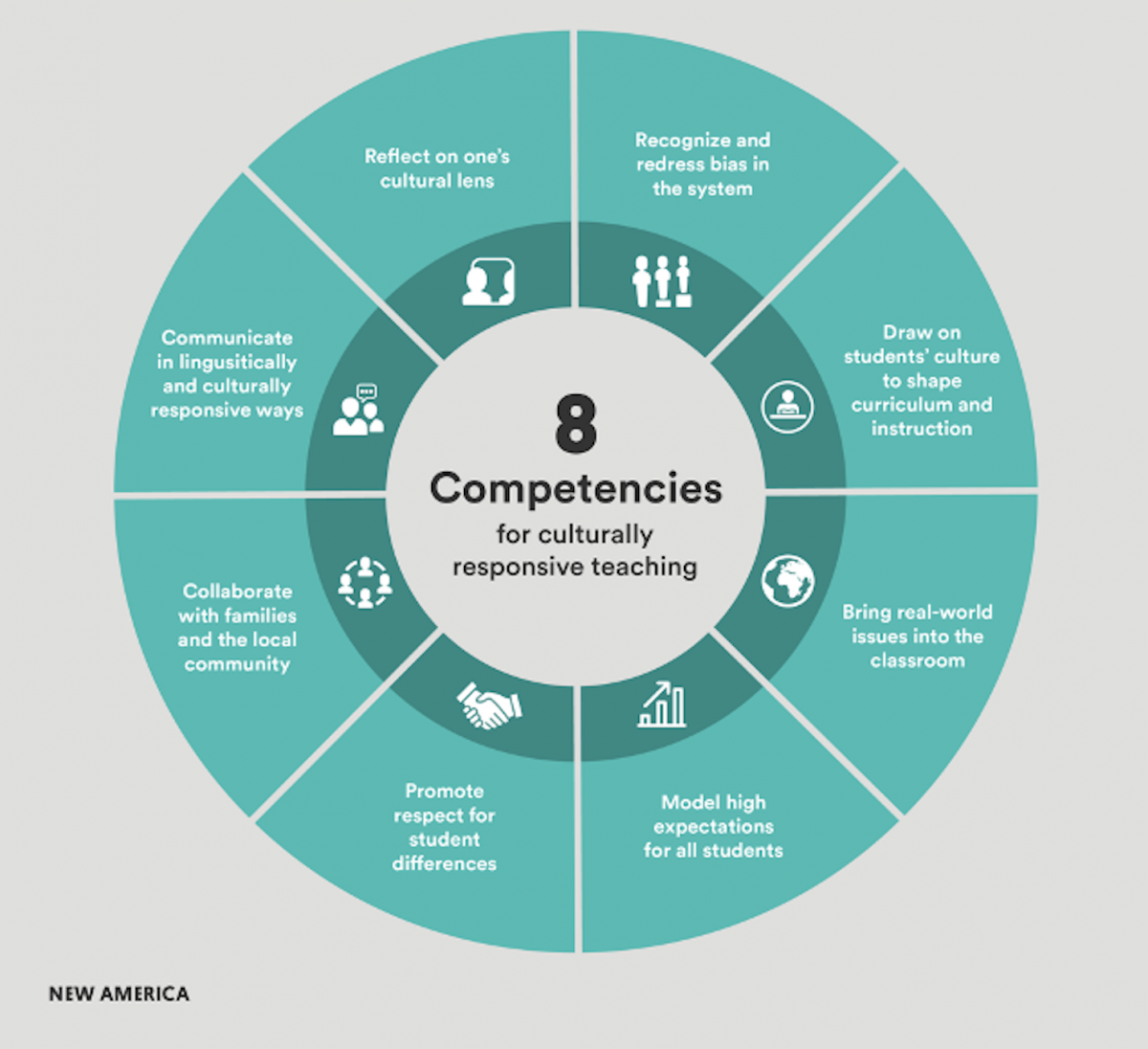
Image courtesy of PCH Vector, Freepik
At OER Africa we were encouraged to see that the UNESCO Recommendation on OER aims to facilitate international cooperation to 'develop a global pool of culturally diverse, locally relevant, gender-sensitive, accessible, educational materials in multiple languages and formats'. This is a powerful ideal, and OER Africa has been grappling with the complexities surrounding diversity promotion. We have written this article in the hope that it contributes to an ongoing conversation – within our initiative and beyond – on diversity in the OER space.
Cultural diversity refers to the practice of including people from varied socio-economic, racial, ethnic, and cultural backgrounds, as well as people of different genders and sexual orientations. This article will focus predominantly on inclusion of people from Africa and the global South.
On 21 May, we celebrated World Day for Cultural Diversity for Dialogue and Development. Despite this, African resources, as well as its people and its languages are underrepresented in global digital knowledge networks. To take one example: Wikipedia has more articles about Paris than it does about the whole of Africa.[1] In addition to a lack of African content, African narratives are often written by people outside Africa, enforcing biases in the content with which Africans engage and in how Africa is represented.
Without knowledge and narratives created by people from Africa, Africans are, from a very young age, prevented from experiencing an accurate representation of their world, in their languages, and from being able to contribute to developing such a representation. This is exacerbated by education systems that are not yet systematically (or systemically) developing the skills young Africans need to contribute to global knowledge networks. These skills include creativity and critical thinking, which could be taught effectively when covering Indigenous Knowledge Systems (IKS), unfortunately an area under-researched and under-taught in African contexts. Creativity and critical thinking allow society a broader perspective, encourage innovative solutions to solving problems and unlock the skill to generate new and useful ideas. Creativity and critical thinking are essential for building self-awareness and agency and unlocking our collaborative futures.
Open licensing offers great promise in this regard, as historically, knowledge production and cultural narratives have been controlled by a minority. More than improving access to knowledge, open licensing can shift the power dynamic and allow more diverse people to be the creators and consumers of knowledge. By improving the diversity of the knowledge that is created, we make it more representative and therefore more accurate. As Clement notes,
When we implement OER, we must continuously ask ourselves ’whose knowledge is being foregrounded and whose view of reality is being entrenched‘ in these materials (Adam et al. 2019)? If decolonization is not foundational to OER implementation, the OER initiative betrays its own philosophy.[2]
As COVID-19 has highlighted, compounding the issues mentioned above is the digital divide, which is widening as many communities do not have access to the Internet or cannot access vital information in their own languages, thereby being excluded from global knowledge networks or participating in them only as passive consumers. However, the influx of mobile phones for access to the Internet has enabled the proliferation of OER access in Africa and beyond. Czerniewicz, Willmers, and Hodgkinson-Williams (2020) explain that, in addition to addressing the cost and lack of access to education materials,
The democratised authorship approach entailed in many forms of OER production is conducive to collaboration and peer-to-peer knowledge production. In this sense, OER can provide a mechanism through which to challenge the Western-oriented worldviews enshrined in traditional textbooks and other teaching materials, and can be used as a tool for addressing transformation in the classroom.[3]
Similarly, Adam, Bali, Hodgkinson-Williams, and Morgan make the point that it is important to critically examine ‘in whose eyes open education is deemed ”valuable”; whose knowledge is being foregrounded and whose view of reality is being entrenched?’[4] It is only through this lens that we can interrogate OERs that may be grounded in coloniality, and move towards an empowering discourse of acceptance and representation. Initiatives to decolonize curricula such as de Beer (2019) [5] provide numerous ideas for making curricula and classrooms less colonial. Examples include: incorporating indigenous knowledge into the teaching of DNA, ethnobotanical knowledge and the making of soaps in science classrooms or laboratories; featuring contextualized practices in health and and agriculture; providing project-and problem-based learning environments for students; using puppets to provide different viewpoints in school classrooms; and using indigenous technologies to solve problems.
Internationally, ‘Achieving the Dream’, which promotes student success in community colleges in the US, shows in Using Open Educational Resources how important OER are. It suggests that, by using OER, culturally responsive educators can adapt and localize content to suit learners’ needs, translate into other languages, incorporate learner content, and ensure that it does not contain bias or stereotypes. Culturally responsive teaching comprises eight competencies, as illustrated in Figure 1. These competencies are relevant for all teaching situations. They include building on students’ prior knowledge and cultural background, accepting that there are multiple ‘ways of knowing’ beyond Western scientific knowledge, and promoting student success rather than competition and ranking.

Figure 1: Competencies for Culturally Responsive Teaching
Source: Culturally Responsive Teaching CC BY
Cultural diversity in OER can be promoted through: the exploration of innovative ways of bringing together people from culturally diverse backgrounds and different parts of the world into decision-making processes regarding OER strategy and advocacy efforts; sourcing funding for people in the global South to create and share OER; and tracking progress for any initiative, or community actions towards achieving tangible cultural diversity outcomes espoused in the OER.
Below are some key resources, websites, and portals that promote cultural diversity especially African culture and Africa-created resources.
- WikiAfrica Education engages young Africans through local cultural organizations to create and translate content about and for Africa on Wikipedia. The goal is to get people engaged and inspired to create content for and about Africa in African languages to ensure better representation of African languages online.
- For teacher education, the OER Africa website Teacher Education Network suggests possible resources and ways in which institutions have used OER with their students.
- The Health Informatics Building Blocks (HIBBs) Program was designed to build workforce capacity in resource constrained environments to plan, develop, manage, and use health information and communications technology applications, with the goal of improving the delivery of health care.
- The OER Africa Agshare collaboration programme created openly shareable different types of OER that strengthened agriculture faculties and curricula and created downstream uses of the OER for other stakeholders.
- The African Storybook OER website and its associated apps enable writers from across the continent to develop their own storybooks and immediately publish them on the website. It also enables translation of any of the approved existing storybooks into home languages. Already over 200 languages of Africa are represented on the website. African Storybook is then a repository of openly licensed storybooks for teachers, librarians and parents to access for young children to practise their reading. The storybooks can be read online, downloaded and printed or read offline via the African Storybook Reader App. Most of the storybooks have been developed by African authors, and they are available in multiple languages to encourage the use of home language reading.
- Digital Open Textbooks for Development (DOT4D) is an initiative at the University of Cape Town with a social justice imperative. One of the initiative’s objectives is to ‘Support open textbook publishing activity at UCT that prioritises strategies for integrating student perspective, curriculum transformation, and sustainability.’
- World Digital Library makes primary materials accessible. These include manuscripts, maps, photos, recordings, films, and more from countries and cultures around the world, made available online free of charge.
- The International Library of African Music (ILAM) was established in 1954 by Hugh Tracey, at Rhodes University in South Africa. The library is one of the world’s great repositories of African music. ILAM is devoted to researching the study of music and oral arts in Africa, it preserves thousands of digitized and open accessible historical recordings collections dating as far back as 1929.
- African Online Digital Library (AODL) is an open access digital library of African cultural heritage materials created by Michigan State University in collaboration with museums, archives, scholars, and communities around the world.
Recent developments in the OER space, together with a disproportionate focus on knowledge production from the global North, highlight an urgent need to promote the cultural diversity agenda in a meaningful way that encourages equity and welcomes voices from Africa and other regions in the global South.
[1] Wikimedia Education Initiative: https://www.techrepublic.com/article/for-wikipedias-20th-anniversary-students-across-africa-add-vital-information-to-site/
[2] Clement, K. (2020). Interrogating and Supplementing OER Through a Decolonized Lens. OER and beyond. https://ijoerandbeyond.org/interrogating-and-supplementing-oer-through-a-decolonized-lens/
[3] Czerniewicz, L., Willmers, M. and Hodgkinson-Williams, C. (2020). Pivoting to open education resources. University World News. Retrieved from https://www.universityworldnews.com/post.php?story=2020042910373650
[4] Adam, T., Bali, M., Hodgkinson-Williams, C. and Morgan, T. (2019). Guest Blog: Can we decolonize OER/Open? #DecolonizeOpen. OER19. Retrieved from https://oer19.oerconf.org/news/blog-can-we-decolonize-oer-open-decolonizeopen/#gref
[5] The decolonisation of the curriculum project. Retrieved from https://doi.org/10.4102/aosis.2019.BK133
